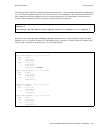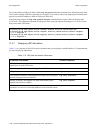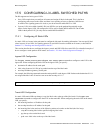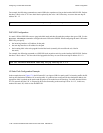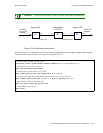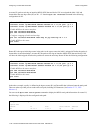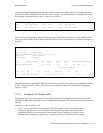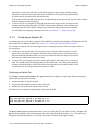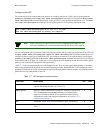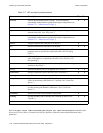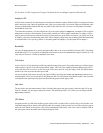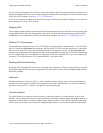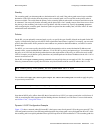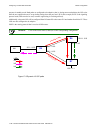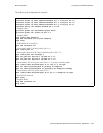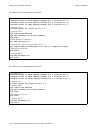
Riverstone Networks RS Switch Router User Guide Release 8.0 17-33
MPLS Configuration Configuring L3 Label Switched Paths
Configuring the LSP
You can then specify the explicit path as the primary or secondary path for the LSP by specifying the parameter
primary
or
secondary
with the
mpls set label-switched-path
commands. For example, the
mpls create
label-switched-path
command shown below creates an LSP L1 to the destination address 100.1.1.1. The
mpls
set label-switched-path
command specifies the explicit path 567 as the primary path for the LSP:
Note
When configuring an explicit LSP, specify the
no-cspf
parameter. Otherwise, the
LSP waits indefinitely for a valid constrained shortest path first (CSPF) response.
You can configure the same parameters for the LSP or for the explicit path. You configure parameters for an LSP with
the
mpls create label-switched-path
or
mpls set label-switched-path
commands; the parameters you
configure at this level apply to all paths in the LSP. You configure parameters for an explicit path by specifying the
primary
or
secondary
path with the
mpls set label-switched-path
command; the parameters you configure
at the explicit path level apply only to that path. If you configure the same parameter at both the LSP and the explicit
path level, the explicit path configuration takes precedence.
Table 17-7 shows the parameters that you can configure for an LSP or for each explicit path (primary or secondary).
Some of the parameters are described in more detail following the table. Remember that if you configure the same
parameter for both an LSP and an explicit path, the explicit path configuration takes precedence. Also note that certain
parameters are only configurable for the LSP.
mpls create label-switched-path L1 to 100.1.1.1 no-cspf
mpls set label-switched-path L1 primary 567 adaptive
Table 17-7 LSP and explicit path parameters
Parameter Description LSP Path
adaptive
LSP waits for a recalculated route to be set up before tearing down the
old LSP. Disabled by default. (See "Policies".)
XX
admin-group
Specifies whether administrative groups are included or excluded on
LSP (see
exclude
and
include
parameters). All administrative
groups are included by default. (For more detailed explanations of
administrative groups and example configurations, see Section 17.7.1,
"Administrative Groups.")
XX
bps
Bandwidth, in bits, to be reserved with RSVP. (See "Bandwidth".)
XX
class-of-service Sets a fixed CoS value for all packets entering the LSP. (See "CoS
Val ue" .)
XX
disable
Disables the LSP or path.
XX



